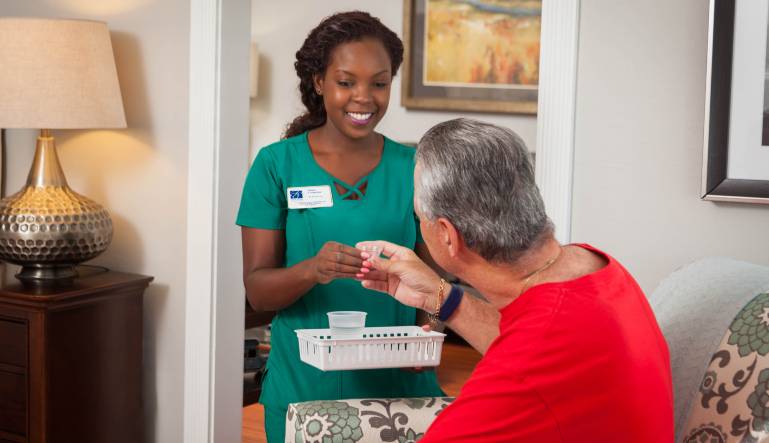Discover the benefits of Assisted Living as a senior care option.
Discover the benefits of Assisted Living as a senior care option.
Blog Article
Exactly How Helped Living Facilities Enhance Lifestyle for Those With Dementia
Helped living facilities play a critical function in improving the top quality of life for individuals with mental deterioration by implementing customized treatment methods that cater to their unique requirements. These settings incorporate organized activities with emotional assistance, cultivating a feeling of neighborhood while ensuring security and self-reliance. The integration of interesting programs and household participation even more enriches the residents' experience. Yet, the complexities of mental deterioration treatment proceed to develop, prompting a more detailed evaluation of just how these facilities adapt and introduce to satisfy the challenges dealt with by citizens and their family members. What effects does this have for future treatment designs?
Personalized Treatment Program
(Memory Care Facilities Charlotte)In numerous situations, people with mental deterioration need tailored support that resolves their one-of-a-kind needs and choices. Individualized care strategies are essential in assisted living settings, as they make certain that each resident obtains appropriate focus and solutions. These plans are established collaboratively, including medical care specialists, caretakers, and member of the family to create an extensive summary of the individual's medical background, cognitive abilities, and personal rate of interests.
A well-structured individualized treatment plan usually includes specific goals related to health monitoring, everyday activities, and social engagement. It makes up the person's cognitive decline while promoting freedom and self-respect. Normal analyses and updates to the care plan are crucial, as they enable for modifications based upon the citizen's developing condition and choices.
Secret elements of these plans commonly entail drug monitoring, behavioral support approaches, and dietary guidelines customized to the individual's requirements (Assisted Living). By concentrating on individualized treatment, assisted living centers can promote a supportive setting that enhances the lifestyle for people with dementia, inevitably adding to their general wellness and happiness. This customized technique respects the individuality of each citizen, ensuring they receive the thoughtful care they call for

Involving Tasks and Programs
Engaging homeowners in meaningful tasks and programs is essential for improving the lifestyle for people with dementia. These activities not only give enjoyment yet also promote cognitive feature and advertise social interaction, which can alleviate sensations of seclusion often experienced by citizens.

In addition, tailored programs are vital in ensuring that each local's distinct preferences and abilities are acknowledged. This tailored method motivates participation, boosts self-confidence, and supplies a feeling of achievement.
Additionally, routine evaluations of homeowners' passions can assist personnel customize and adapt activities to far better match developing demands. By focusing on appealing activities and programs, assisted living centers can dramatically boost the general experience and emotional health of individuals coping with mental deterioration.
Safe and Supportive Setting
Creating a secure and encouraging atmosphere is important for individuals with mental deterioration, as it directly impacts their health and lifestyle. Helped living centers are created with particular features that advertise safety while cultivating a complacency and comfort. These environments focus on ease of access, with layouts that lessen confusion and urge self-reliance, allowing citizens to navigate their environments much more conveniently.
Security procedures, such as safe entries and exits, stop wandering and unapproved access, which are critical factors to consider for individuals with dementia (Memory Care). Personnel are trained to acknowledge the special needs of citizens, providing tailored assistance and supervision to guarantee their security. Furthermore, the consolidation of relaxing colors and acquainted items can aid decrease anxiousness and disorientation, creating a much more calming atmosphere.
In enhancement to physical safety and security, emotional support is vital. Facilities usually employ personnel that are not just skilled in caregiving but also trained in compassion and interaction, cultivating trust and rapport with locals. This alternative strategy adds to a caring environment where people really feel valued and understood, ultimately enhancing their general high quality of life.
Social Communication and Area
An encouraging setting not just focuses on safety but likewise promotes chances for social interaction and neighborhood interaction, which are crucial for people with dementia. In assisted living facilities, structured activities and communal areas motivate residents to get in touch with each other, minimizing sensations of seclusion usually experienced by those with cognitive impairments.
Social communication plays a significant function in enhancing emotional health and cognitive feature (Memory my latest blog post Care). Involving with peers in group tasks such as video games, arts and crafts, or workout not only stimulates cognitive capabilities but additionally supports a feeling of belonging. Facilities often arrange occasions that promote socialization, permitting locals to build connections and share experiences, which can be especially advantageous for those with dementia
Moreover, a lively neighborhood ambience can improve the overall lifestyle for citizens. Personnel are trained to promote interactions and support homeowners in developing significant connections. By developing a society of interaction, assisted living facilities assist individuals with dementia preserve social skills and boost their mood, eventually adding to an extra fulfilling life experience. This community-oriented approach is necessary in handling the obstacles related to dementia, advertising a feeling of function and connection for citizens.
Family Involvement and Assistance
Family participation is crucial in supporting people with dementia in assisted living environments. Actively involving family participants not just provides emotional comfort to citizens yet also promotes a feeling of belonging and connection in their lives. When families take part in treatment preparation and daily activities, they add beneficial insights regarding the person's choices, background, and needs, which can enhance personalized care.
Furthermore, routine family members visits can considerably boost the psychological health of residents, decreasing feelings of seclusion and anxiousness. Household participants can additionally assist in maintaining cognitive function by engaging their loved ones in familiar conversations and activities. This communication enhances individual identification and assists citizens feel valued and recognized.

Verdict
Finally, helped living centers dramatically improve the lifestyle for individuals with mental deterioration with customized care strategies, engaging activities, and a secure atmosphere. These aspects foster cognitive stimulation, psychological well-being, and a feeling of self-reliance. In addition, routine social communications and solid household involvement add to significant links and psychological support. Collectively, these factors produce a holistic strategy to care that addresses the distinct demands of individuals with dementia, advertising overall wellness and dignity.
Report this page